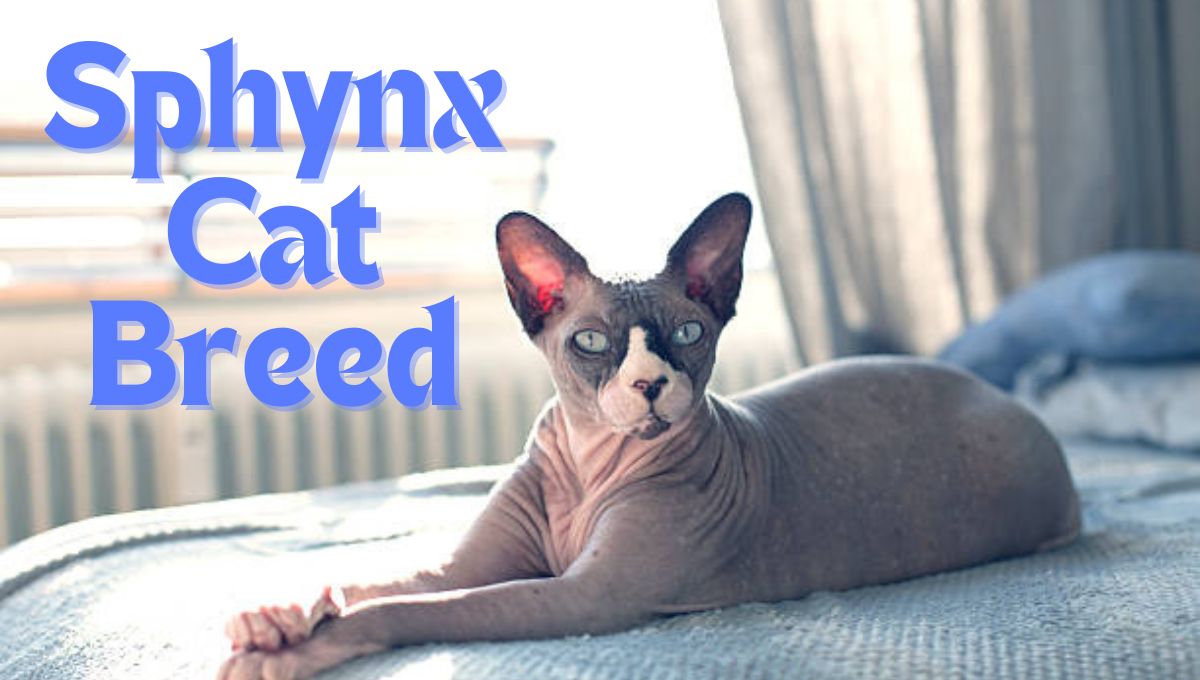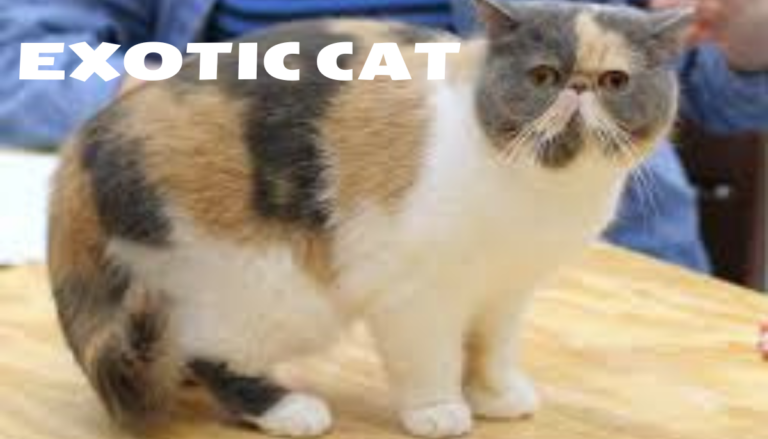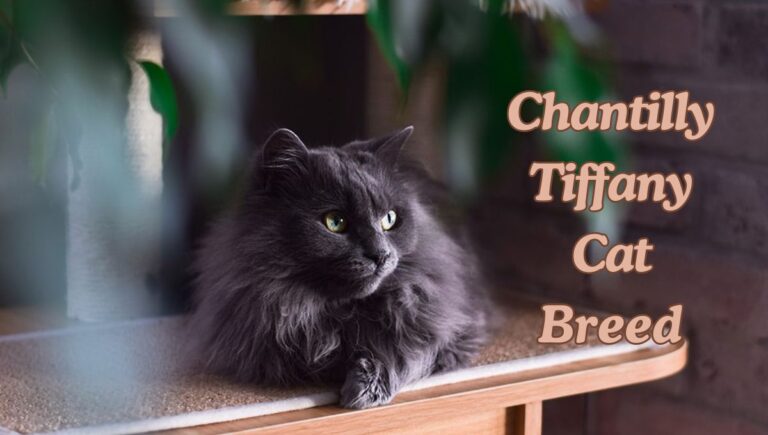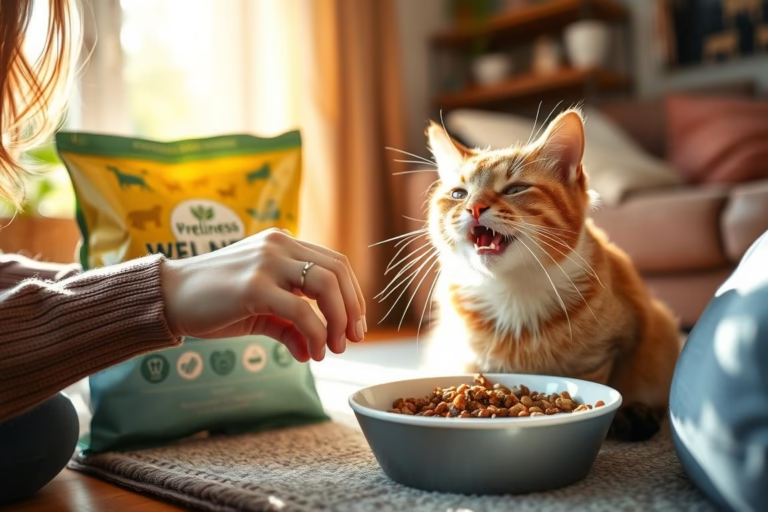Sphynx Cat Breed
The Sphynx cat breed, derived from the ancient Egyptian sphinx statues, is renowned for its distinctive hairless appearance. Despite lacking fur, these cats possess a unique beauty characterized by their sleek, soft skin, reminiscent of warm suede. Their striking physical features include large ears, expressive eyes, and wrinkled skin, which contribute to their captivating allure. While their appearance may initially draw attention, it’s their loving and affectionate nature that truly sets them apart.
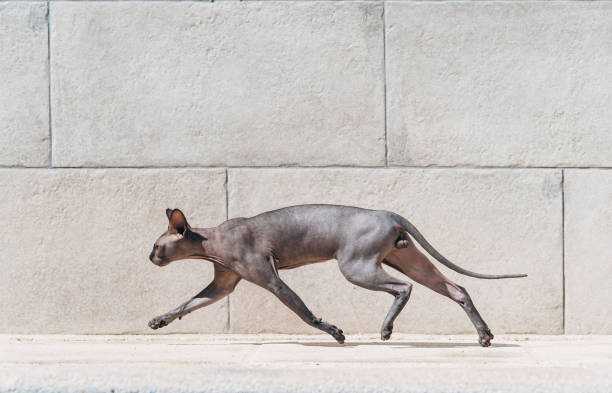
Beyond their striking appearance, Sphynx cats are known for their outgoing and sociable personalities. They thrive on human interaction and are often described as being highly affectionate and people-oriented. These cats enjoy being the center of attention and will often seek out cuddles and affection from their owners. Their playful and energetic nature means they love interactive play and engaging in activities that stimulate both their mind and body. Sphynx cats form strong bonds with their human companions, making them ideal pets for those seeking a loyal and loving feline companion.
Despite their lack of fur, Sphynx cats are surprisingly low-maintenance when it comes to grooming. Without a coat to shed, they require minimal grooming compared to their furry counterparts. However, it’s important to protect their delicate skin from sunburn and extreme temperatures by providing indoor living conditions and applying pet-safe sunscreen when venturing outdoors. Regular baths are also necessary to remove excess oils from their skin and prevent any potential skin issues. With proper care and attention to their unique needs, Sphynx cats can thrive and bring joy to their owners with their affectionate nature and charming personality.
Table of Contents
I. Origin and History of Sphynx Cat Breed :
Discuss the Breed’s Origins and Historical Significance :
- The Sphynx cat breed’s origins can be traced back to the 1960s in Toronto, Canada, where the first known hairless kitten named Prune was born.
- The breed’s development involved a series of planned crosses between hairless cats and various breeds, including Devon Rex and domestic shorthairs, to establish a genetically diverse foundation.
- These early breeding efforts aimed to create a new breed with a unique appearance while maintaining a robust and healthy gene pool.
- Despite originating in Canada, the breed gained international recognition and popularity, leading to its establishment as a distinct breed recognized by major cat registries worldwide.
Geographical Region of Origin :
- The Sphynx cat breed’s geographical region of origin is primarily North America, with Canada serving as its birthplace.
- The breed’s development and refinement occurred within breeding programs in Canada, where breeders selectively crossed hairless cats with other breeds to achieve the desired characteristics.
- However, the breed’s popularity quickly spread globally, leading to its presence in countries around the world.
Influence on Modern Characteristics :
- The Sphynx cat breed’s origin from planned crosses between hairless cats and other breeds has influenced its characteristics today.
- While the breed is known for its hairlessness, it also inherits traits from its foundation breeds, such as the Devon Rex’s large ears and slender body, contributing to its unique appearance.
- The selective breeding process aimed to produce cats with friendly and affectionate personalities, resulting in Sphynx cats being known for their sociable nature and love of human companionship.
- Additionally, the breed’s origin from various genetic backgrounds helps maintain genetic diversity, which is essential for minimizing the risk of inherited health issues.
Folklore and Legends :
- The development of the Sphynx cat breed is not steeped in ancient folklore or legends like some other breeds.
- However, the breed’s striking appearance and unique history have led to it being associated with mystique and intrigue, much like the ancient Egyptian sphinx statues from which it takes its name.
- The breed’s emergence as a new and distinct breed in the 20th century has captured the imagination of cat enthusiasts worldwide, contributing to its iconic status in the realm of feline breeds.
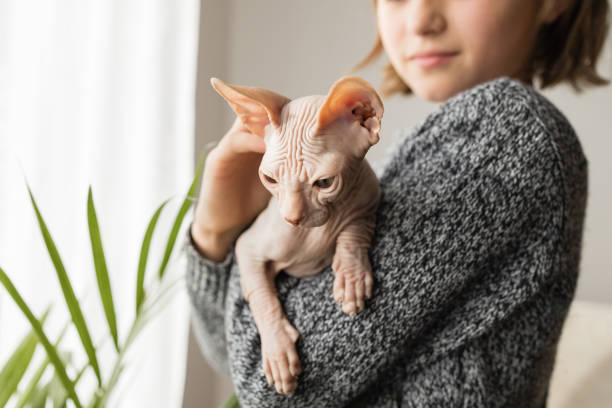
II. Physical Characteristic of Sphynx Cats :
| Height | Sphynx cats are generally medium-sized cats, with males typically being larger than females. On average, they stand between 8 to 10 inches tall at the shoulder. |
| Weight | The weight of Sphynx cats can vary depending on factors such as age, sex, and individual genetics. Adult males typically weigh between 8 to 12 pounds, while females usually weigh between 6 to 10 pounds. |
| Life Span | Sphynx cats have a relatively long life span compared to some other cat breeds. On average, they live between 12 to 15 years, although some may live into their late teens or even early twenties with proper care. |
| Good With | Sphynx cats are known for their affectionate and sociable nature, making them excellent companions for individuals and families alike. They typically get along well with children, other pets, and even strangers, thanks to their outgoing and friendly demeanor. |
| Temperament | Sphynx cats are highly affectionate, playful, and people-oriented. They enjoy being the center of attention and thrive on human interaction. They are often described as being curious, intelligent, and eager to explore their surroundings. |
| Intelligence | Sphynx cats are known for their high level of intelligence. They are quick learners and enjoy interactive games and puzzle toys that stimulate their minds. Their intelligence also makes them relatively easy to train, including teaching them tricks and obedience commands. |
| Shedding Amount | Despite being hairless, Sphynx cats still produce some oil on their skin, which can transfer onto furniture and clothing. However, they do not shed in the same way as cats with fur, making them a good choice for individuals with allergies to cat dander. |
| Grooming | phynx cats require regular bathing to remove excess oil and debris from their skin. They also need occasional ear cleaning and nail trimming. While they don’t require brushing like furry cats, they may benefit from skin moisturizers to keep their skin healthy. |
| Exercise Needs | Sphynx cats have moderate exercise needs and enjoy playing and climbing. Providing them with toys, scratching posts, and opportunities for interactive play sessions will help keep them mentally and physically stimulated. |
| Energy Level | Sphynx cats are energetic and playful, but they also enjoy lounging and cuddling with their human companions. They are adaptable to different lifestyles and can thrive in both active and relaxed environments. |
| Meowing Level | Sphynx cats are not particularly vocal compared to some other breeds. They may meow occasionally to communicate with their owners, but they are not known for excessive vocalization. |
| Drool amount | Sphynx cats are not typically prone to excessive drooling. However, individual cats may drool slightly when they are particularly relaxed or content. |
| Coat Length/Texture | Sphynx cats are known for their lack of fur, but they do have a fine layer of short, soft hair that feels like peach fuzz. Their skin is wrinkled and can vary in texture, feeling warm and soft to the touch. |
| Colors | Sphynx cats come in a variety of colors and patterns, including solid colors, tabby, tortoiseshell, and pointed (like Siamese cats). They can also have bi-color or tri-color patterns. |
| Patterns | In addition to solid colors, Sphynx cats can exhibit a wide range of patterns, including tabby stripes, spots, and mottled patterns. Their patterns can be subtle or bold, depending on individual genetics. |
Detailed Physical Characteristic of the Sphynx Cat Breed :
Size :
- Sphynx cats are medium-sized cats, with males typically being larger than females.
- Adult males generally weigh between 8 to 12 pounds (3.6 to 5.4 kg), while females typically weigh between 6 to 10 pounds (2.7 to 4.5 kg).
- They stand at an average height of 8 to 10 inches (20 to 25 cm) at the shoulder.
Coat Type :
- Sphynx cats are known for their lack of fur, but they have a fine layer of short, soft hair that feels like peach fuzz.
- Their skin is wrinkled and may have a slightly oily texture due to the absence of fur.
Coat Texture and Length:
- The coat texture of Sphynx cats is soft and velvety, with a warm and smooth feel to the touch.
- Their short hair is sparse and may vary slightly in length, but it generally does not exceed a few millimeters.
Color Variations :
- Sphynx cats come in a wide variety of colors and patterns.
- Common colors include solid colors such as white, black, blue, red, cream, and chocolate.
- They can also have tabby stripes, spots, tortoiseshell patterns, and pointed patterns (like Siamese cats).
- Bi-color and tri-color patterns are also seen in Sphynx cats.
Distinctive Features :
- One of the most distinctive features of Sphynx cats is their lack of fur, which sets them apart from most other cat breeds.
- They have large, bat-like ears that are wide at the base and taper to a point, giving them an alert and expressive appearance.
- Sphynx cats often have wrinkled skin, particularly around the head, neck, and shoulders, adding to their unique and endearing appearance.
- Their eyes are large and expressive, ranging in color from green, blue, gold, or copper, depending on individual genetics and coat color.
- Sphynx cats have a muscular and sturdy build, with a broad chest and strong, well-developed limbs.
- Their tail is long and slender, tapering to a fine point, and may be slightly curved or straight.
- Overall, the combination of their hairless appearance, distinctive ears, wrinkled skin, and expressive eyes makes Sphyn
III. Temperament and Personality of Sphynx Cats :
Typical Temperament and Personality Traits :
- Friendly and Sociable: Sphynx cats are known for their outgoing and affectionate nature. They thrive on human interaction and enjoy being the center of attention.
- Playful and Energetic: These cats are highly energetic and love engaging in interactive play. They have a playful demeanor that persists well into adulthood.
- Curious and Intelligent: Sphynx cats are naturally curious and intelligent. They enjoy exploring their surroundings and are quick learners, often figuring out how to open doors or solve simple puzzles.
- Affectionate and Loving: Sphynx cats form strong bonds with their owners and enjoy cuddling and snuggling. They are often described as “velcro cats” because they like to be close to their human companions.
- Adaptable and Easygoing: Sphynx cats are generally adaptable to different environments and lifestyles. They get along well with children, other pets, and even strangers, thanks to their friendly and easygoing nature.
Common Behavioral Traits :
- Attention-Seeking: Sphynx cats crave attention and may become vocal or demanding if they feel ignored. They thrive on human interaction and may follow their owners around the house.
- Playfulness: These cats have a playful and mischievous streak. They enjoy interactive toys, climbing, and exploring, and may get into playful antics around the house.
- Warmth-Seeking: Due to their lack of fur, Sphynx cats have a higher body temperature than other cats and may seek out warm places to curl up, such as laps, blankets, or sunny spots in the house.
- Chatty: While not excessively vocal, Sphynx cats may communicate with their owners through soft chirps, trills, or meows. They may vocalize to express their needs or to seek attention.
Managing and Addressing Breed Specific Behavioral Issues :
- Provide Plenty of Attention: Sphynx cats thrive on human interaction, so make sure to spend quality time with them each day, engaging in play and cuddle sessions.
- Enrichment Activities: Keep your Sphynx cat mentally stimulated with toys, puzzles, and interactive games to prevent boredom and encourage natural behaviors.
- Establish Routine: Sphynx cats appreciate routine and may become anxious or stressed if their environment changes suddenly. Stick to a consistent feeding, play, and bedtime schedule.
- Positive Reinforcement: Use positive reinforcement techniques, such as treats and praise, to reward desirable behaviors and discourage unwanted ones.
- Regular Veterinary Check-Ups: Ensure your Sphynx cat receives regular veterinary care to address any health issues that may affect their behavior and well-being.
By understanding and addressing the unique behavioral traits of the Sphynx cat breed, owners can cultivate a strong bond with their feline companions while ensuring a harmonious and enriching environment for both cat and owner.
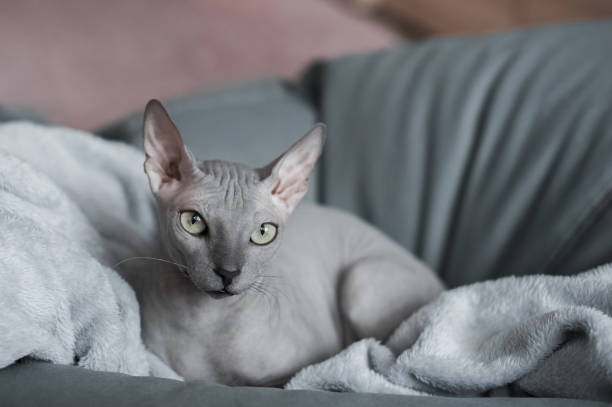
IV. Care and Maintenance of Sphynx Cat Breed :
Grooming Needs :
- Coat Care and Hygiene: Despite their lack of fur, Sphynx cats still require regular grooming to maintain skin health and hygiene. Their skin may produce oil, which can accumulate and require bathing to prevent buildup.
- Grooming Tips: Bathe your Sphynx cat regularly using a mild cat shampoo to remove oil and debris from the skin. Use lukewarm water and ensure thorough rinsing to prevent skin irritation. Pay special attention to skin folds and creases, as these areas can trap dirt and moisture.
- Brushing Frequency: While Sphynx cats don’t require brushing like furry breeds, they may benefit from occasional gentle brushing with a soft bristle brush or grooming mitt to remove loose skin cells and promote circulation.
- Grooming Tools: Invest in grooming tools specifically designed for Sphynx cats, such as a gentle cat shampoo, soft bristle brush or grooming mitt, and moisturizing skin products formulated for cats.
- Accessories and Care Products: Consider providing your Sphynx cat with a cozy bed or blanket to help regulate body temperature, especially in cooler climates. Additionally, interactive toys and scratching posts can help keep them mentally and physically stimulated.
Health Consideration :
- Common Health Problems: Sphynx cats may be prone to certain health issues, including skin conditions such as dermatitis and sunburn due to their lack of fur. They may also be susceptible to respiratory issues, dental problems, and heart conditions like hypertrophic cardiomyopathy.
- Recommended Veterinary Care: Schedule regular veterinary check-ups for your Sphynx cat to monitor their health and address any potential issues early. Discuss preventive measures such as vaccinations, parasite control, and dental care with your veterinarian.
- Average Lifespan: The average lifespan of a Sphynx cat is between 12 to 15 years, although some may live longer with proper care and attention to their health needs.
- Promoting Healthier Life: Provide a balanced diet, regular exercise, and a stimulating environment to promote a longer and healthier life for your Sphynx cat. Monitor their weight and adjust their diet as needed to prevent obesity, which can contribute to health problems.
Nutrition :
- Proper Nutrition: Feed your Sphynx cat a high-quality, balanced diet formulated for their age, size, and activity level. Choose cat food that provides essential nutrients, including protein, vitamins, and minerals, to support their overall health and well-being.
- Dietary Recommendations: Consider feeding your Sphynx cat a combination of wet and dry cat food to ensure adequate hydration and nutrient intake. Consult with your veterinarian for specific dietary recommendations tailored to your cat’s individual needs.
- Dietary Restrictions: Sphynx cats may have specific dietary restrictions or allergies, so monitor their food intake and watch for any signs of digestive upset or allergic reactions.
- Feeding Schedule: Establish a regular feeding schedule with set meal times to maintain consistency and prevent overeating. Monitor portion sizes and avoid free-feeding to prevent obesity.
Exercise :
- Types of Exercise: Provide your Sphynx cat with plenty of opportunities for play and physical activity. Interactive toys, climbing structures, and puzzle feeders can help stimulate their minds and keep them engaged.
- Duration and Frequency: Aim for at least 15 to 20 minutes of interactive playtime each day to help burn off excess energy and prevent boredom. Encourage your Sphynx cat to engage in active play by using toys that mimic natural hunting behaviors.
- Breed-Specific Needs: Sphynx cats are generally active and playful, so they may enjoy activities like chasing toys, climbing, and exploring their environment. Be sure to provide a variety of toys and activities to keep them mentally and physically stimulated.
V. Suitability of Sphynx Cats :
Compatibility with Children and Other Animals :
- Children: Sphynx cats are generally well-suited for families with children. They are affectionate and sociable, often enjoying the company of children and participating in interactive play. However, it’s essential to teach children how to handle and interact with cats gently and respectfully to prevent accidental injury or stress for the cat.
- Other Pets: Sphynx cats are typically tolerant of other pets, including dogs and other cats. Their friendly and outgoing nature often makes them adaptable to living in multi-pet households. Proper introductions and gradual acclimation can help ensure a smooth transition for all pets involved.
Special Considerations for Multi-Pet Households :
- Introducing the Breed: When introducing a Sphynx cat to existing pets, it’s essential to do so gradually and under controlled circumstances. Provide separate spaces for each pet initially, allowing them to become familiar with each other’s scents before direct interactions. Supervise initial interactions closely and intervene if any signs of aggression or discomfort arise.
- Establishing Boundaries: Set clear boundaries for all pets in the household and provide individual spaces where they can retreat if needed. Monitor interactions between pets closely, especially during the initial adjustment period, and address any conflicts or territorial behaviors promptly.
Environmental Needs :
Sphynx cats have a few special environmental needs due to their unique characteristics:
- Temperature Regulation: Sphynx cats lack a coat, which means they don’t have the natural insulation that other cats do. As a result, they are more sensitive to temperature extremes. It’s important to keep them in a warm environment, especially in cooler climates. Providing warm spots for them to rest, such as heated beds or blankets, can be beneficial.
- Sun Protection: Since they lack fur, Sphynx cats are more susceptible to sunburn. If they spend time outdoors, it’s crucial to provide them with shade or even consider using pet-safe sunscreen on exposed areas, like their ears and nose.
- Hygiene: Sphynx cats don’t have fur to absorb oils, so they need regular baths to remove excess oils from their skin. Additionally, their large ears may require more frequent cleaning to prevent wax buildup and infections.
- Comfortable Surfaces: Sphynx cats may prefer soft surfaces to sit on, as their lack of fur means they don’t have the same natural cushioning that other cats do. Providing soft bedding or cushions can help keep them comfortable.
- Attention to Skin Health: Without fur to protect their skin, Sphynx cats are prone to skin issues such as acne, dryness, and even sunburn. Regular skin checks and grooming are essential to monitor for any abnormalities and keep their skin healthy.
- Indoor Living: Due to their lack of fur and temperature sensitivity, Sphynx cats are typically best suited for indoor living. Indoor environments provide more control over temperature and sun exposure, reducing the risk of discomfort or health issues.
By addressing these specific needs, you can help ensure that your Sphynx cat remains healthy, comfortable, and happy in their environment.
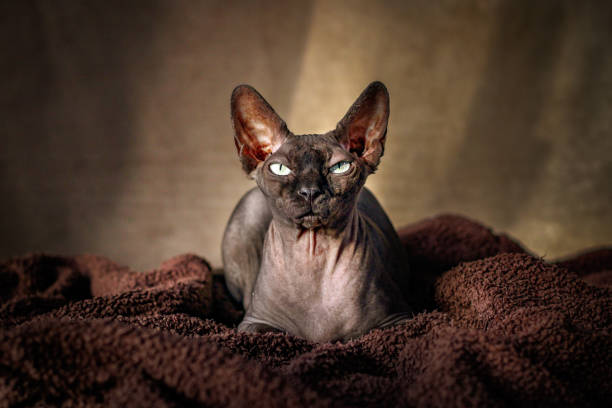
VI. Adoption and Breeder Consideration of Sphynx Cat Breed :
Adoption from Shelters or Rescue Organizations :
- Adopting a Sphynx cat from a shelter or rescue organization can be a rewarding experience for both the cat and the adopter.
- Benefits of adoption include giving a cat in need a second chance at a loving home, reducing pet overpopulation, and supporting ethical animal welfare practices.
- Many shelters and rescue organizations carefully screen their animals for health and temperament, ensuring that they are suitable for adoption into a new home.
- By adopting a Sphynx cat from a shelter or rescue, you not only save a life but also open up space for another cat in need.
Guidance on Selecting a Reputable Breeder :
- When selecting a breeder for a purebred Sphynx cat, it’s crucial to research and choose one who prioritizes the health and well-being of their cats.
- Look for breeders who are registered with reputable cat associations and adhere to ethical breeding practices, including health screenings for genetic conditions.
- A responsible breeder will provide documentation of health screenings for their breeding cats, such as testing for hypertrophic cardiomyopathy (HCM) and other common health issues in Sphynx cats.
- Visit the breeder’s facility in person to assess the living conditions and ensure that the cats are well-cared-for and socialized.
Cost Consideration and Potential Adoption Fees :
- The cost of adopting or purchasing a Sphynx cat can vary depending on factors such as the cat’s age, pedigree, and location.
- Adoption fees for Sphynx cats from shelters or rescue organizations typically range from $50 to $200, covering vaccinations, spaying/neutering, and other basic care.
- Purchasing a Sphynx cat from a reputable breeder can be more expensive, with prices ranging from $1,500 to $3,000 or more for a kitten with pedigree papers.
- In addition to the initial adoption or purchase cost, it’s essential to budget for ongoing expenses such as food, litter, veterinary care, and grooming supplies.
- Consider the long-term financial commitment of owning a Sphynx cat, including potential veterinary bills for routine care and unexpected emergencies.
VII. Conclusion
The Sphynx cat breed stands out for its distinctive appearance, characterized by its hairless body, velvety skin, and striking features. Despite their lack of fur, Sphynx cats possess a unique beauty and charm that captivates cat enthusiasts worldwide. Their large ears, expressive eyes, and wrinkled skin add to their endearing appeal. Beyond their appearance, Sphynx cats are known for their affectionate and sociable nature. They thrive on human interaction and enjoy being involved in daily activities, making them beloved companions for families and individuals seeking a loyal and loving feline friend.
Responsible ownership of a Sphynx cat entails providing proper care and attention to meet their unique needs. While they may require regular bathing to maintain skin health and hygiene, Sphynx cats are generally low-maintenance compared to furry breeds. However, prospective owners should be prepared to invest time and effort into creating a stimulating environment for their pet, including providing toys, scratching posts, and opportunities for interactive play. Additionally, regular veterinary check-ups and a balanced diet are essential for ensuring the health and well-being of a Sphynx cat throughout its life.
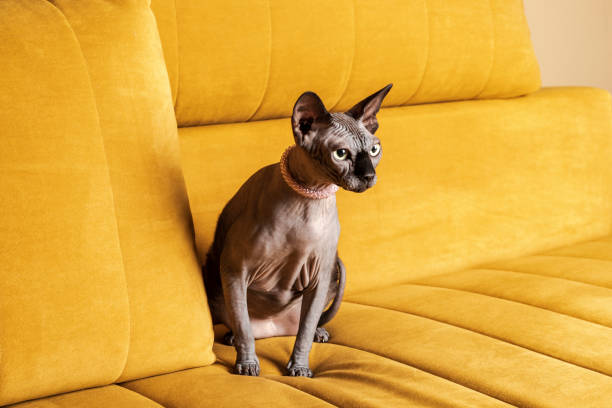
Whether considering adoption from shelters or purchasing from a reputable breeder, it’s crucial for prospective owners to approach the decision with careful consideration. Adoption not only provides a loving home to a cat in need but also supports ethical animal welfare practices. Conversely, purchasing from a reputable breeder ensures the health and genetic integrity of the cat, but it’s essential to research and choose a breeder who prioritizes the well-being of their cats. By embracing the responsibilities of pet ownership and providing a nurturing environment, owners can experience the unique joy and companionship that a Sphynx cat brings into their lives.
FAQ about Sphynx Cat Breed :
How long do Sphynx cats live?
On average, Sphynx cats live between 12 to 15 years, although some may live longer with proper care and attention to their health needs.
What health issues are common in Sphynx cats?
Sphynx cats may be prone to certain health issues, including skin conditions such as dermatitis and sunburn due to their lack of fur. They may also be susceptible to respiratory issues and heart conditions like hypertrophic cardiomyopathy.
Are Sphynx cats good with children and other pets?
Yes, Sphynx cats are generally good with children and other pets. They are sociable and adaptable, making them great companions for families with kids or other animals.
Do Sphynx cats get cold easily?
Due to their lack of fur, Sphynx cats may be more sensitive to temperature extremes and may require additional warmth in cooler climates. Providing cozy bedding and warm spots in the house can help keep them comfortable.

